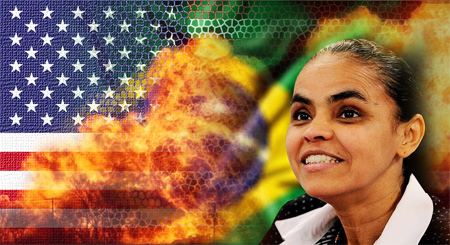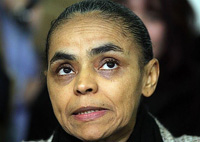Marina Silva – Part of Plan to Destabilize Brazil
September 23, 2014

Former President Luiz Inácio Lula da Silva, the Dilma Rousseff party mate, is out on the stump backing the incumbent President. He doubts Silva has any chances at the election. According to him, it’s not Silva, but rather some media outlets that pose a real threat. They use to their advantage the difficulties emerged as a result of ongoing social and economic reforms implemented to serve the people’s interests. Still the country is on the way to progress, large industrial projects are implemented. Lula is confident that the truth will win over lies.
 The support of former President to Dilma Rousseff is important. As a result Silva may lose many votes. Giving an interview to one of the newspapers Silva burst in tears saying she cannot control what the former President said about her, but she could do her best not to hurt him in return. The ex-President immediately responded saying that Marina Silva did not have to lie about him shedding tears. She had other reasons to cry about. The meaning is clear. Silva is not so confident about the victory, that’s what provokes her emotions. Silva was in the ranks of the Workers Party for more than a quarter of century, she made her career standing side by side with Lula. During his tenure she was a senator before becoming environmental minister in 2003. All those years she was closely watched by the US. She was under surveillance by special funds of different kinds and international organizations looking for those who had promising future to make them serve Washington’s interests. It’s enough to have a look at the decorations and awards she received with the help of American friends to understand she was in the focus of their attention as far back as in the 1980s. Of course, they took into consideration the specific features of her personality, including the inclination to compensate physical attractiveness with achievements in her political career.
The support of former President to Dilma Rousseff is important. As a result Silva may lose many votes. Giving an interview to one of the newspapers Silva burst in tears saying she cannot control what the former President said about her, but she could do her best not to hurt him in return. The ex-President immediately responded saying that Marina Silva did not have to lie about him shedding tears. She had other reasons to cry about. The meaning is clear. Silva is not so confident about the victory, that’s what provokes her emotions. Silva was in the ranks of the Workers Party for more than a quarter of century, she made her career standing side by side with Lula. During his tenure she was a senator before becoming environmental minister in 2003. All those years she was closely watched by the US. She was under surveillance by special funds of different kinds and international organizations looking for those who had promising future to make them serve Washington’s interests. It’s enough to have a look at the decorations and awards she received with the help of American friends to understand she was in the focus of their attention as far back as in the 1980s. Of course, they took into consideration the specific features of her personality, including the inclination to compensate physical attractiveness with achievements in her political career.
Brazilis becoming a strong, sovereign and self-assertive state with great clout in the Western Hemisphere challenging the US influence. The debates in Washington are held behind closed doors but one thing is evident – the US wants to change Rousseff for somebody more pliant. Marina Silva seems to serve the purpose.US special services paved the way for her success by eliminating another candidate Eduardo Campos, the leader of Socialist Party. His Cessna 560ХL plane suddenly went down before landing and crashed. French Slate.fr listed the plane crash as one of the five most important happenings this summer that missed the radar screen but could exert seriously influence the global politics. Before the tragedy Dilma Rousseff was considered to be a sure winner. Silva’s joining the presidential race complicated things for the Workers Party trying to hold to power. No doubt Brazil will become more pro-US in case Silva takes office. The spying scandal and the statements by President Rousseff about US eavesdropping in Brazil being unacceptable will become a thing of the past. Unasur (The Union of South American Nations - Spanish: Unión de Naciones Suramericanas, or UNASUR - an intergovernmental union integrating two existing customs unions: Mercosur and Andean Community of Nations as part of a continuing process of South American integration) and Mercosur (Spanish: Mercado Común del Sur, a sub-regional bloc comprising Argentina, Brazil, Paraguay, Uruguay and Venezuela with Chile, Bolivia, Colombia, Ecuador and Peru as associate countries. The purpose is to promote free trade and the fluid movement of goods, people, and currency) will no longer be in the focus of Brazilian foreign policy. The re-organization of the Organization of American States, the issue most important for the United States, will top the list of foreign policy priorities. Mercosur may continue to exist, but not as a competitor for ALCA (the Free Trade Area of the Americas) that Washington had tried to push through till 2005 when the idea was refused by Argentina, Brazil, Venezuela and some other states. Silva is not very enthusiastic about BRICS prospects. She believes the participation in this group brings no dividends. She has no intention to strengthen the relations with Russia and China, the alliance with Venezuela and Cuba will no longer be effective. Everything the administrations of Lula Luiz Inácio Lula da Silva and Dilma Rousseff have achieved so far will go down the drain to please the North American power.
The pre-election battle has become a fierce fight. Silva has no time to lose and the load is becoming too heavy. On and off she calls back her statements according to the reaction of public. She had to explain her intention to reduce the production of oil in areas called “pre-salt,” located under the maritime bed. Silva had expressed her rejection of gay marriage in the past but made a flip-flop to support it. Marina Silva (Brazilian Socialist Party), an evangelical who belongs to the conservative Assembly of God, retracted her support for gay marriage one day after she presented her government plan. The chapter Citizenship and Identities of the program included “support for proposals defending ... civil marriage.” The Silva's campaign team released a statement correcting the text. The new version defends “the rights of a civil union between people of the same sex”, deleting the word “marriage”, which would include more rights for a couple. In the second debate between the main candidates ahead of the October 5 first round vote, Rousseff sought to come off the ropes three days after Brazil entered recession, asking environmentalist Silva how she would finance her some $60 billion of policy commitments. "Where do you propose to get the money from?" asked Rousseff, seeking to give her Workers Party (PT) a fourth straight term leading Latin America's powerhouse. "First, these are not promises, they are commitments," responded Silva, who served as environment minister under Rousseff's presidential predecessor Luiz Inacio Lula da Silva. The money would be raised, she insisted, "through our country returning to efficiency in public spending - today there is widespread wasting of public resources." Rousseff was right when she expressed her doubt that someone with such unstable views and convictions could rule the country.
More Brazilians start to realize that Silva would radically change the policies to lead the country to national disaster. That is exactly what the “puppeteers” from Washington would like to achieve. Silva has psychological problems, she is an unbalanced person – it all may influence the decision making process to hinder the Brazil’s progressive development and break the social balance as the country’s political forces learn to interact within the constitutional framework. The mission Washington wants to accomplish is creating prerequisites for staging a “color revolution” in Brazil. It wants to use “the fifth column” and pro-US media outlets for provoking “spontaneous civil protests.”
The US sends more experienced people to its embassy in Brazil. The Central Intelligence Agency’s station is manned by to the full be seasoned cloak and dagger warriors. Colonel Samuel Prugh is the senior defense official and defense attaché to Brazil. With unique experience in data collecting and human intelligence he has a lot of personal acquaintances among the Brazilian military and knows the country well. Luiz Inacio Lula da Silva and Dilma Rousseff did their best to avoid public demonstration of discontent with US subversive activities conducted inside the country. Off and on the Brazilians used protected diplomatic channels to tell Washington they have uncovered an agent operating under cover in oil industry, diplomatic office or the armed forces of the country. Incidents never became public domain. After the well-known scandal related to the reports that the U.S. National Security Agency tapped President’s personal communications and spied on Brazil’s state oil company the Brazilian government took a tough stand and demanded public apologies.The US government refused to apologize and even intensified its intelligence gathering efforts in Brazil. The US sent more people to work in consulates. The consulate office in Rio de Janeiro stands out. It workers boasts 500 staffers. John Creamer, the Consul General, says 300 of them process visa applications from early morning till late night. According to him, it the processing used to take up to six months before. Now one-two weeks is enough. Are the consulates workers are really so much concerned over issuing visas or are they busy preparing the “Arab Spring” or “Ukrainian Maidan” type of events under the US special services’ auspices? Time will tell.